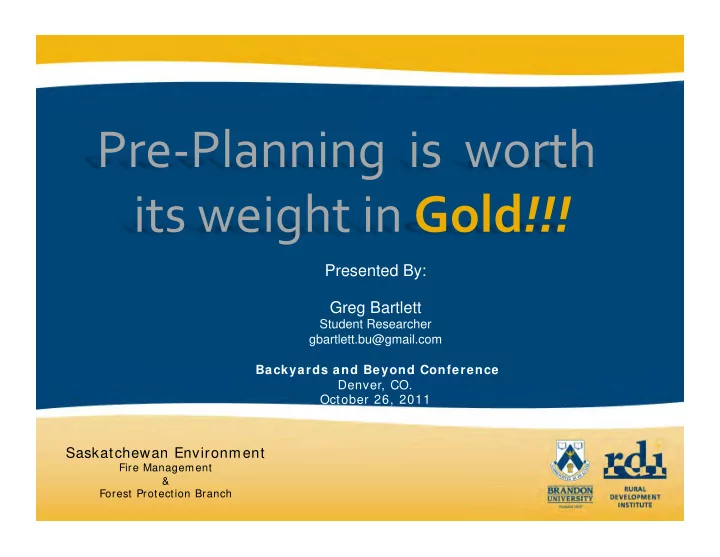

Presented By: Greg Bartlett Student Researcher gbartlett.bu@gmail.com Backyards and Beyond Conference Denver, CO. October 26, 2011 Saskatchewan Environment Fire Management & Forest Protection Branch
Little ¡About ¡Me… ¡ • ¡1998 ¡ ¡Canadian, ¡DND, ¡ ¡Civilian ¡ Firefighter ¡ • 2004 ¡City ¡of ¡Toronto, ¡Fire ¡Service, ¡ Training ¡Specialist ¡ • 2006 ¡Province ¡of ¡Saskatchewan, ¡ ¡ Provincial ¡Wildfire ¡Prevention ¡ Officer ¡ • 2008 ¡Province ¡of ¡Alberta, ¡Wildfire ¡ Patrolman ¡ • 2009-‑Present ¡ ¡B.S.c. ¡( ¡A.D.E.S ¡), ¡ Student. ¡Brandon ¡University ¡ Manitoba, ¡Canada ¡
Presentation ¡Overview ¡ Provincial ¡Fire ¡Situation ¡ Team ¡Responsibility ¡ Mine ¡Situation ¡ Team ¡Response ¡ Environmental ¡Protection ¡Assessment ¡ Opportunities ¡for ¡Research ¡ Concluding ¡Remarks ¡
Province ¡of ¡Saskatchewan ¡
Province ¡of ¡Saskatchewan ¡
Provincial ¡Fire ¡Situation ¡Overview ¡ July ¡/ ¡ 2006 ¡ 9 ¡fire ¡complexes ¡provincially ¡ Nationally ¡everyone ¡else ¡busy ¡ Muskose ¡complex ¡ ¡5 th ¡in ¡provincial ¡priority ¡ Limited ¡resources ¡ Helicopters ¡ Burn ¡teams ¡ Air ¡tankers ¡ Personnel ¡
Team ¡Responsibility ¡ Four ¡fires ¡by ¡Deschambault ¡Lake ¡ Active ¡suppression ¡ Protection ¡of ¡mine ¡site, ¡was ¡requested ¡by ¡mine ¡site ¡ manager ¡ No ¡mine ¡safety ¡officer ¡on ¡site ¡ ¡
Mine ¡Situation ¡Overview ¡ Partial ¡evacuation ¡in ¡place ¡– ¡4 ¡fires ¡threatening ¡mine ¡site ¡ Losing ¡$149,000 ¡per ¡day ¡ Transportation ¡ Food ¡and ¡lodging ¡ Wages ¡ Lost ¡production ¡ Pressure ¡to ¡change ¡policy, ¡as ¡ ¡the ¡mine ¡was ¡in ¡compliance ¡ ¡
Economic ¡Value ¡ Infrastructure ¡$200 ¡ million ¡(relatively ¡small) ¡ Remote ¡and ¡isolated ¡ Most ¡large ¡equipment ¡ was ¡brought ¡in ¡on ¡ice ¡ roads ¡
Team ¡Response ¡ Assessment ¡of ¡situation ¡ Met ¡mine ¡management ¡ Flew ¡over ¡fires ¡with ¡mine ¡management ¡to ¡ ¡stress ¡critical ¡risk ¡ Listened ¡to ¡concerns ¡ Continued ¡good ¡communications ¡ Assigned ¡Expert ¡Assistance ¡ Wildland ¡Urban ¡Interface ¡Specialist ¡ Experienced ¡Suppression ¡Leader ¡
Position ¡Responsibilities ¡ Wildland ¡Urban ¡Interface, ¡Specialist ¡ ¡ Alerted ¡command ¡staff ¡to ¡the ¡hazardous ¡materials ¡& ¡storage ¡ issues ¡ Reviewed ¡and ¡organized ¡evacuation ¡and ¡suppression ¡plan ¡ Managed ¡sprinkler ¡system ¡ Suppression ¡Advisor ¡ Managed ¡fuels ¡, ¡(Trees) ¡ Supervised ¡suppression ¡plan ¡ Supervised ¡20 ¡mine ¡workers ¡drawn ¡from ¡mine ¡rescue ¡team ¡ and ¡surface ¡workers ¡
Hazardous ¡Material ¡on ¡Site ¡ 400,000 ¡Kg ¡ (441 ¡tons) ¡ sodium ¡cyanide ¡ 20,000 ¡Kg ¡ (22 ¡tons) ¡ hydrochloric ¡acid ¡ 2.5 ¡million ¡liters ¡ (66O,OOO ¡ ¡us/gal) ¡of ¡diesel ¡ Gold ¡mines ¡have ¡toxic ¡chemicals ¡due ¡to ¡the ¡ milling ¡process ¡ Potential ¡to ¡be ¡a ¡“World ¡Class ¡Catastrophe” ¡ Know ¡Your ¡Stakeholders!!!! ¡
Air ¡Dispersion ¡Model ¡ Based ¡on ¡chemicals ¡present ¡ Four ¡models ¡run ¡ Three ¡threat ¡zones ¡ Life ¡threatening ¡ Severe ¡health ¡risks ¡ Mild ¡discomfort ¡
E.P. ¡Assessment ¡ 5 ¡Km ¡ (3 ¡miles) ¡ evacuation ¡zone ¡ 10 ¡Km ¡ (6 ¡miles) ¡exclusion ¡zone ¡ Up ¡to ¡5 ¡Km ¡nothing ¡living ¡ Many ¡years ¡of ¡clean ¡up ¡required ¡
E.P. ¡Assessment ¡Concerns ¡ SCBA’s ¡only ¡good ¡for ¡60 ¡minutes ¡ No ¡fly ¡zone: ¡5 ¡km ¡ (3 ¡miles) ¡radius, ¡3000 ¡ft ¡ Have ¡to ¡walk ¡into ¡site ¡to ¡assess ¡ Logistically ¡impossible ¡to ¡manage, ¡no ¡ ¡ ¡ ¡ ¡ ¡ ¡ ¡runway ¡for ¡staging ¡responses. ¡ Evacuate ¡underground ¡(Emergency ¡Action ¡Plan) ¡ 3 ¡days ¡supplies ¡ Recommended ¡a ¡full ¡week ¡
Hazardous ¡Material ¡Storage ¡ VERY ¡POOR ¡ Liquid ¡chemicals ¡uphill ¡from ¡solids ¡ Stored ¡on ¡wooden ¡pallets ¡ Unstable ¡ground/poor ¡practices ¡ Standing ¡diesel ¡in ¡containment ¡facilities ¡
Hazardous ¡Material ¡ Management ¡ Do ¡not ¡add ¡water ¡– ¡before ¡or ¡after ¡hazardous ¡materials ¡ catch ¡on ¡fire ¡ Oxidizers ¡– ¡ ¡toxic ¡fumes ¡and ¡toxic ¡steam ¡ Incomplete ¡combustion ¡is ¡worse ¡than ¡complete ¡combustion ¡ Toxic ¡sludge ¡and ¡runoff ¡ ¡ Let ¡burn ¡– ¡hotter ¡the ¡better ¡ Evacuate ¡all ¡but ¡skeleton ¡staff ¡
Debrief ¡ ¡Recommendations ¡ Fire ¡staff ¡receive ¡1 st ¡Response ¡Training ¡ 12 ¡hour ¡NFPA ¡471 ¡& ¡472 ¡ E.P. ¡Officer ¡Liaison ¡position ¡with ¡in ¡Forest ¡Fire ¡Mgt. ¡ M.O.U.’s ¡ ¡developed ¡with ¡private ¡Hazmat ¡Teams. ¡(major ¡cities) ¡ Hazardous ¡sites ¡identified ¡on ¡Sask. ¡Environment ¡Values ¡at ¡Risk ¡ website ¡ Fire ¡staff ¡access ¡to ¡industry ¡emergency ¡& ¡pre-‑incident ¡plans ¡
End ¡Results ¡-‑ ¡Mine ¡ Mine ¡received ¡significant ¡amount ¡of ¡ ¡ “ FREE ” ¡ consultation ¡ ¡ Mine ¡forced ¡to ¡bring ¡in ¡consultants ¡at ¡their ¡expense ¡ Chemical ¡storage ¡ Emergency ¡and ¡incident ¡pre-‑planning ¡ Interested ¡in ¡receiving ¡some ¡W.U.I. ¡training ¡
Where ¡We ¡Are ¡ ¡ Today ¡ Fire ¡Landscape ¡Laboratory ¡Proposal ¡ Western ¡Economic ¡Diversification ¡Canada ¡ Technology ¡transfer ¡ Research ¡outcomes ¡documented ¡and ¡shared ¡ Videos, ¡papers ¡and ¡workshops ¡ Demonstration ¡sites ¡ Education ¡and ¡further ¡research ¡ Public ¡& ¡Industry ¡Education ¡Opportunities ¡ Media ¡involvement ¡
Conclusion ¡ Simple ¡sprinkler ¡job ¡was ¡much ¡more ¡! ¡ Fires ¡did ¡not ¡reach ¡mine ¡site ¡ Good ¡lessons ¡learned ¡ ¡ Built ¡positive ¡relations ¡with ¡mine ¡staff ¡and ¡E.P. ¡staff ¡ Research ¡partnerships, ¡with ¡Industry ¡and ¡Academics. ¡ WE ¡GOT ¡TO ¡KNOW ¡OUR ¡STAKEHOLDERS ¡! ¡
Questions? ¡
Recommend
More recommend